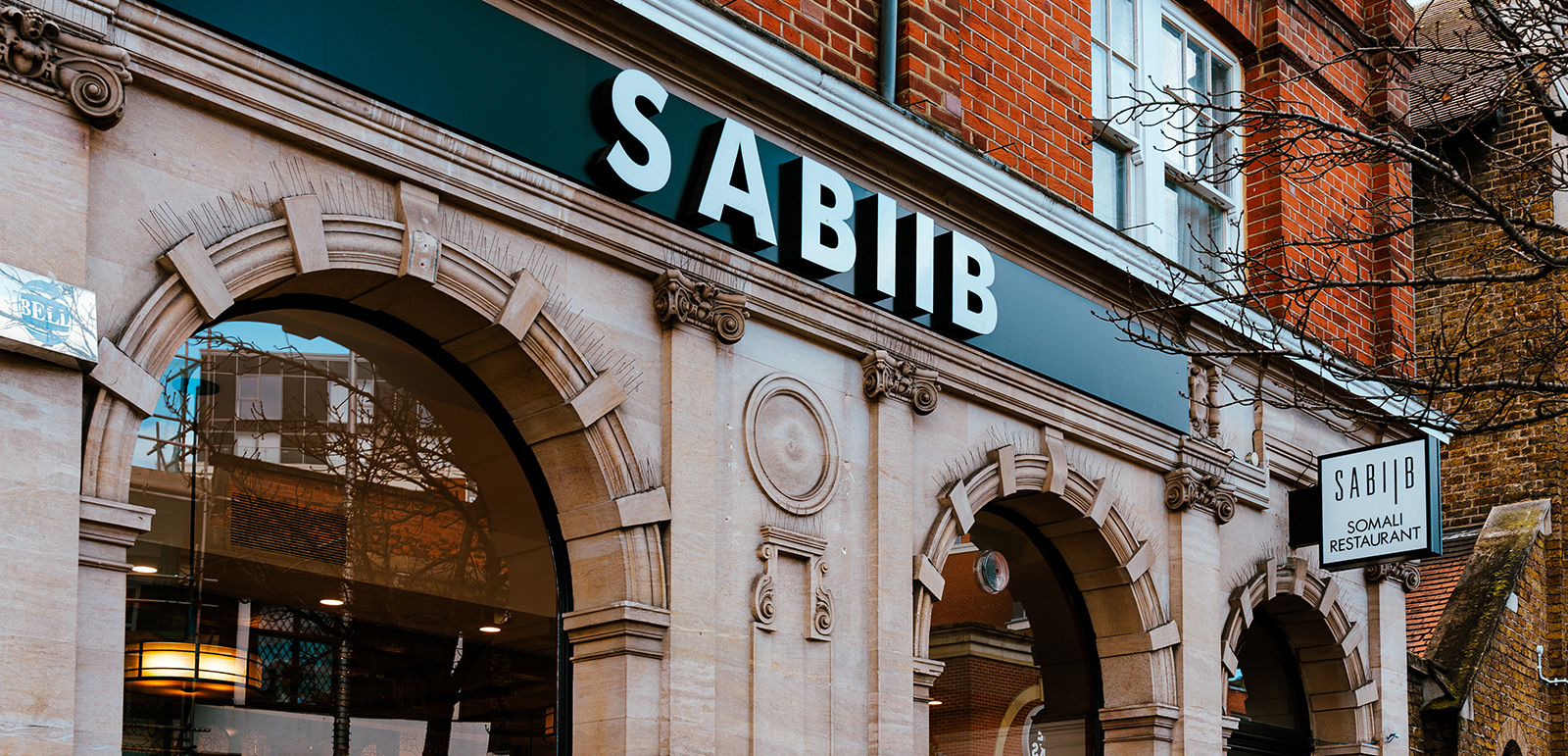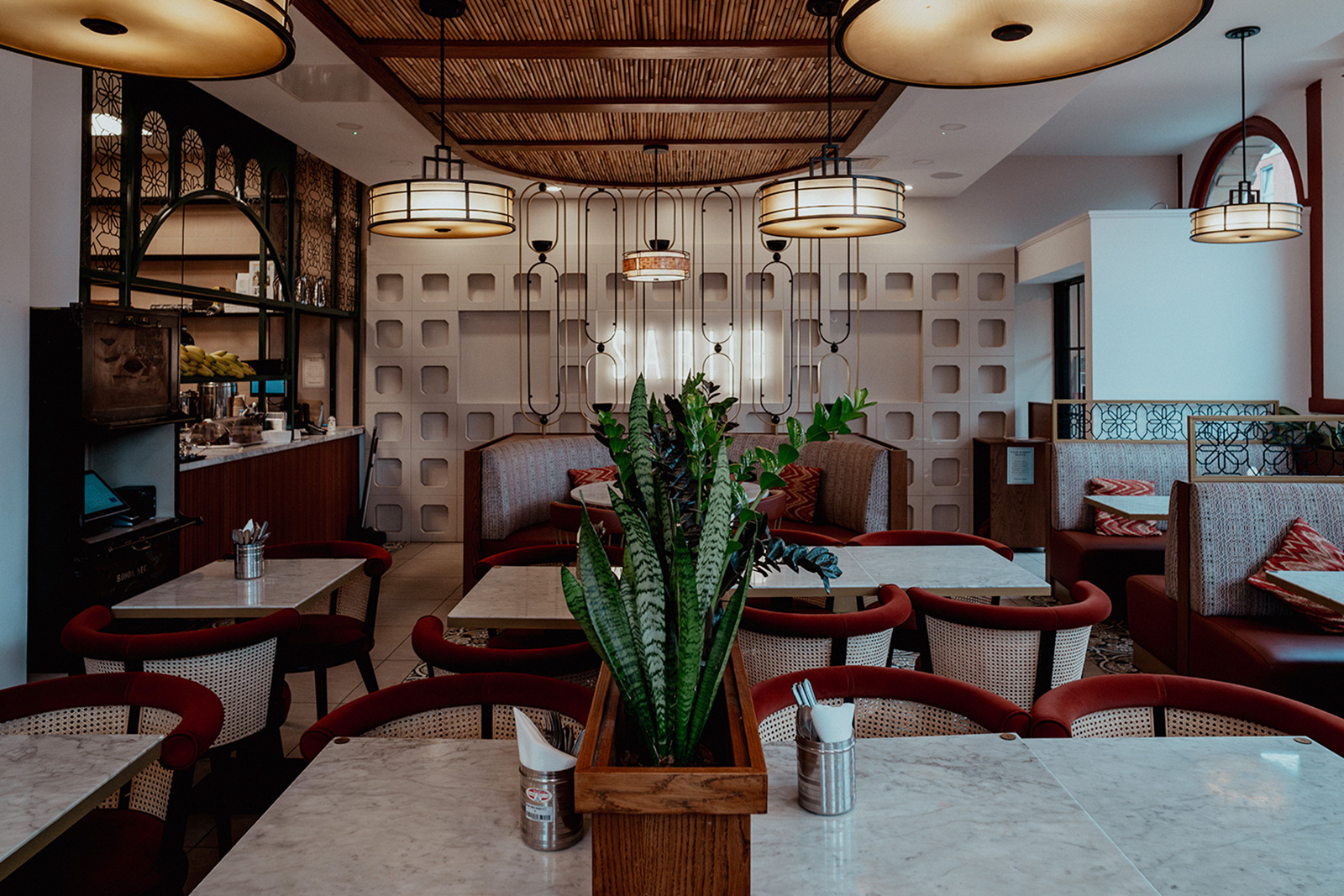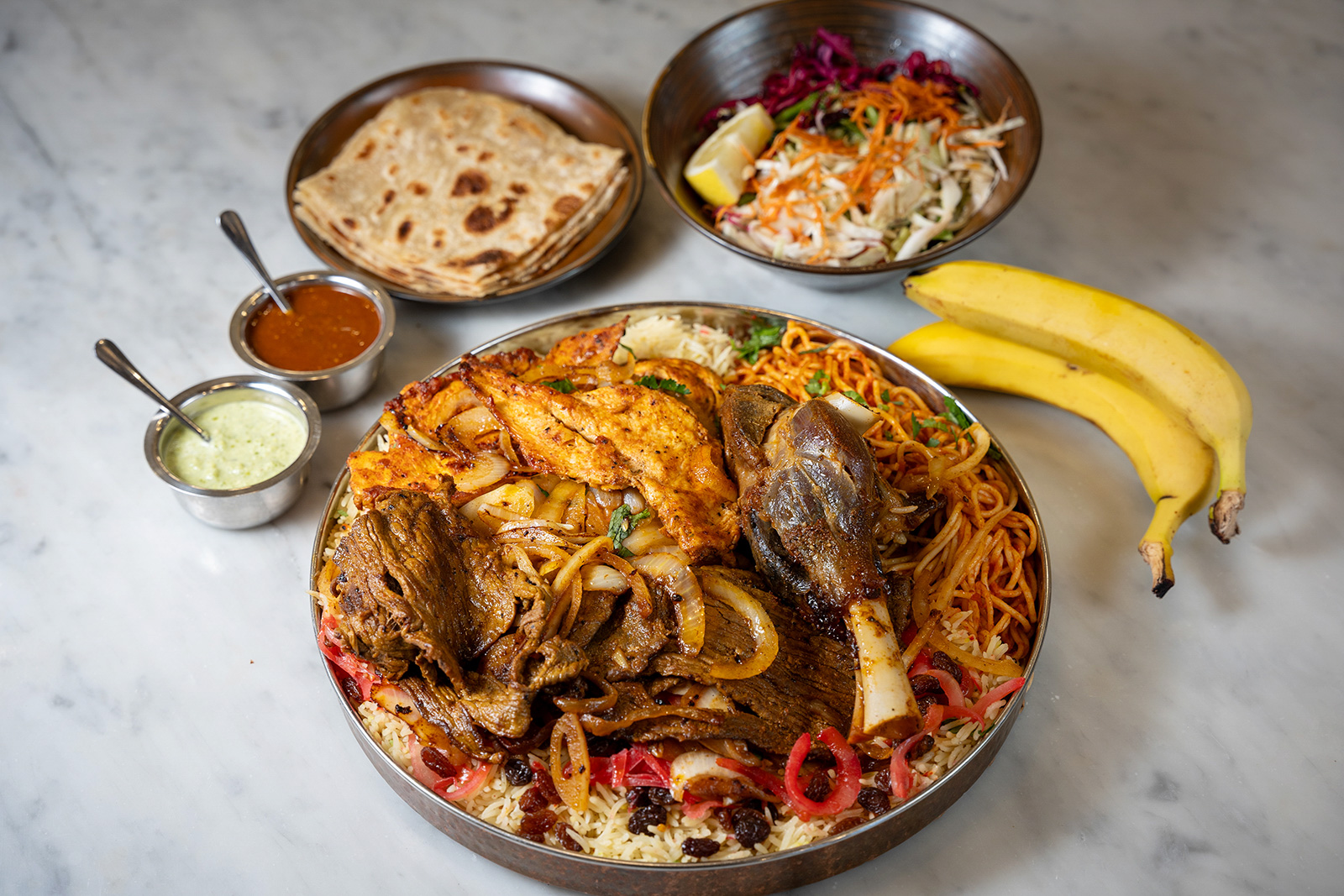Sabiib brings Somali food to the people
A corner of west London, once the preserve of fast food shops and convenience stores, has become one of the capital’s hottest culinary destinations
–

“Instead of ‘I’m going for an Indian’, why not ‘I’m going for Somali’” asks Liban Ibrahim, the owner of Sabiib in west London. It may sound like a tall order, but within months of opening, this sleek, modern restaurant on Acton High Street is already helping to bring Somali food to the masses.
Launched in June 2023 and situated in a former bank, first-time patrons would be forgiven for thinking that they had been transported to a whole different city when they walk through Sabiib’s doors. The aroma of cloves, cinnamon and delicately spiced roast lamb wafts across the airy, naturally lit space, plants snake up the walls and wood and bamboo panels fill the ceiling.
Inspired by the architecture of Mogadishu, the Somali capital, the aesthetic is art-deco-meets-Islamic. The dramatically arched windows, the lush greenery and vibrant fabrics, reminiscent of the designs seen on traditional Somali macawis sarongs, all combine to create a warm and welcoming atmosphere.
Sabiib has been years in the making. Although initially beset by delays related to the Covid-19 pandemic, it appears to have arrived at the perfect time, with interest in Somali food now growing at a rapid pace. Lately, Al Kahf, a Somali restaurant of 10 years’ standing, based in Whitechapel, has also ridden a wave of TikTok virality and favourable media attention, featuring in the Sunday Times and receiving a glowing review by Jimi Famurewa of the Evening Standard.
It’s not difficult to see why so many diners are embracing Somali cuisine. The food at Sabiib comes in generous portions and is best experienced on the restaurant’s sharing platters, which are available for two to five people.

Marinated slow-roast roast lamb, served on a bed of rice studded with raisins and pistachio slivers, falls off the bone. Next to it sits spaghetti in tomato sauce. The pasta is a reminder of Italian colonisation in the Horn of Africa, but the sauce is entirely Somali. Reminiscent of the pasta dishes made by mothers from all over the Middle East and South Asia, it is spiked with cumin and warm spice, but deeper and richer. To complete the spread, beef suqaar — small pieces of diced meat with onions and peppers in a thick sauce — is mopped up with flaky sabaayad flatbread and accompanied by a fresh banana.
The sambusa — crisp, triangular, filled pastries — share a similar name and appearance to South Asian samosas, but the comparison ends there. The minced lamb filling is sweet with caramelised onion and delicately spiced with coriander and cumin. And a visit to Sabiib is not complete without a glass of shaah, a milky tea laden with ginger, cinnamon, cardamom and cloves. Hot, not too sweet and best drunk with the freshly baked timir date cake and caramel sauce, it holds its own against the best masala and karak chais in London.
Ibrahim’s idea of placing Somali cuisine as firmly on the British culinary map as a Friday-night curry is ambitious, but it’s actually surprising that wider acceptance has taken so long. The UK Somali community, estimated at around 200,000 people, is the largest in Europe and dates back to the late 19th century, when seamen and merchants arrived in port cities such as Liverpool, Cardiff and London. Its numbers grew with sailors from British Somaliland who had served with the Royal Navy in the second world war, but the largest increase came during the 1980s and 1990s, as a result of the ongoing civil war in the country.
Comparing one cuisine to another is often reductive and fails to do justice to either. However, the rich and complex flavours — spice, chilli, sweetness — that feature in rice, bread, pasta and meat dishes give Somali food a homely familiarity to people accustomed to Middle Eastern or south Asian cooking. The appeal of Somali eateries to Muslim customers is also clear. Most tend to be alcohol-free and family-friendly, while some provide dedicated prayer spaces and women’s sections.

“As a community we have many non-Somali friends, especially the younger generation,” says Ibrahim, 49. “Anyone I have given my wife’s cooking to or who has tried Somali dishes elsewhere has gone crazy over it. In Minnesota, in the US, where there is a large Somali community, the Somali sambusa is even served at NFL games.”
The idea for Sabiib came to Ibrahim on a trip to Nairobi. After visiting an expansive Somali restaurant, spread over three floors and feeding customers from all walks of life, he came away thinking that he could do something similar in London. He was also inspired by the aesthetic and professionalism he experienced in the modern Indian-inspired restaurant chain Dishoom.
Sabiib’s kitchen team is mostly made up of women from the local Somali community and everything is made in house, from the flaky sambusas to the sinus-clearing basbaas chilli sauce. The central ethos is based around martiqaad, a particularly Somali take on hospitality, which involves providing guests with the very best in food and service.
Ibrahim is aware that many visitors to his restaurant will be new to the dishes on offer, so staff are always on hand to explain the menu, which also contains a helpful guide. That dedication to accessibility has helped to build a clientele that is varied in both age and background. Driving past most weekends, a line of customers waiting for tables now snakes down the high street.
The recent Christmas week proved exceptionally busy, with Sabiib serving around 3,000 diners. Now, Ibrahim has introduced a breakfast menu, featuring sharing platters of eggs, fuul, kidney beans, hummus, fresh sabaayad flatbreads and malawah pancakes.
Thanks to such dishes, a corner of Acton that was once the preserve of fast food chains and grocery shops has quickly become a destination for culinary explorers and the local Somali community alike. While Somali food may still have a way to go before it reaches the ubiquity of other national cuisines, it is clear that there is plenty of room in the capital for authentic, traditional food, served with this level of care and commitment.
Topics
Get the Hyphen weekly
Subscribe to Hyphen’s weekly round-up for insightful reportage, commentary and the latest arts and lifestyle coverage, from across the UK and Europe
